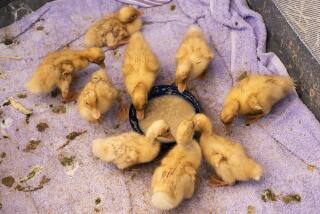Well, at least these ducks aren’t chicken about crossing the road.
- Share via
The mallards of Madrona Marsh have been having a downright fowl breeding season this year.
First, a four-year drought dried up the Torrance wetlands, making it impossible to raise ducklings safely. Local foxes kept eating the eggs because the marsh wasn’t deep enough to keep the predators away. So the mallards flew off to temporary quarters close to nearby back-yard swimming pools, where they laid eggs, hatched families and generally annoyed the heck out of their human neighbors.
As their youngsters grew, the mallards took to wandering the streets near the marsh. About the same time, the city dumped some tap water into Madrona to help the marsh along. Then Mother Nature stepped in with an unseasonably late rainstorm.
And soon the ducks began heading toward Madrona. Unfortunately, the little ones couldn’t fly yet. So the ducks tried to waddle on home.
They might have made it, too, if it weren’t for all those cars on Madrona Avenue and Sepulveda Boulevard. Alarmed that their web-footed friends might soon become Duck a la Asphalt, concerned humans called animal control officers to stop the ducks from crossing the roads.
Three times in three weeks, Officers Joyce Davis and Tori Matthews from the Society for the Prevention of Cruelty to Animals have responded to calls asking them to help the mallards.
Each time, they managed to capture the ducklings unharmed. The first brood of 11, however, was separated from mother when she flew away as the officers closed in. She had been leading her youngsters eastbound on Plaza del Amo in traffic lanes.
A week later, the officers scooped up a mother duck and her nine babies as they wandered in the parking lot at the Del Amo Mall. Then, on Wednesday, the officers intercepted a mother trying to lead her nine adolescent ducklings across Sepulveda Boulevard into the marsh.
The officers blame a new city fence at Madrona Marsh for the sudden increase in duck pedestrians. Unlike the old chain-link fencing, the new fence, a $150,000 wrought iron creation that is open at the bottom, lets the ducks easily waddle out of the marsh, they say.
Pinfeathers, says city naturalist Walton Wright, who insists that no mallards nested at the parched Madrona Marsh this year.
He opposes the society’s suggestion that the city put up some kind of barrier along the bottom of Madrona’s iron fence.
“You wouldn’t be fencing (the ducks) in. You would be fencing them out,” Wright said. “And you would be fencing in the foxes that . . . would starve if they couldn’t get out to forage across the way in the restaurant dumpsters.
“This isn’t a zoo. We aren’t feeding the animals,” Wright said. “You can’t pen them up.”
As Madrona’s water level rises and ducks can both hatch and raise their families there safely again, the web-footed pedestrian problem should disappear, he said.
And that will be just ducky.
More to Read
Sign up for Essential California
The most important California stories and recommendations in your inbox every morning.
You may occasionally receive promotional content from the Los Angeles Times.













